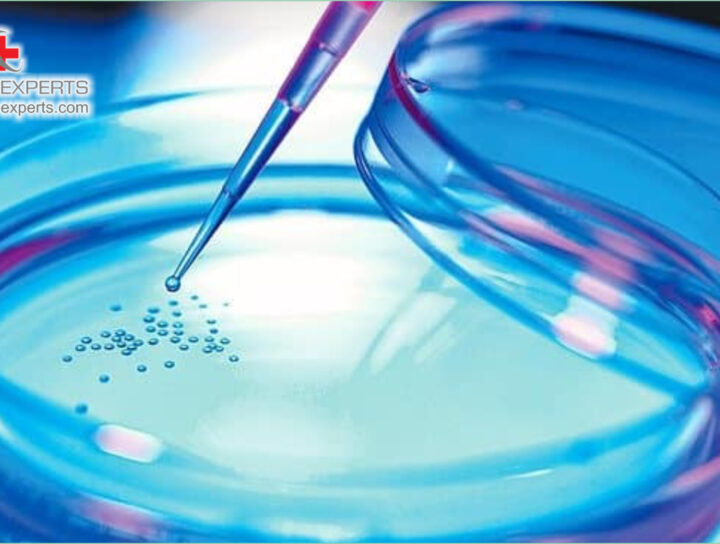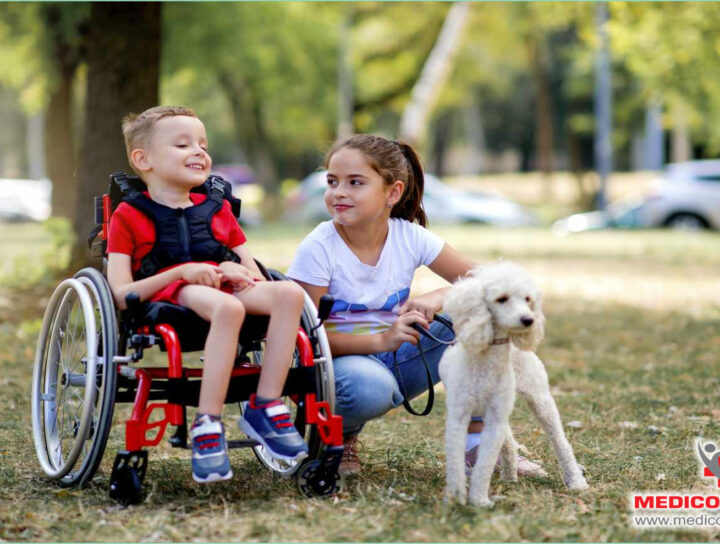New Horizons in Autism Care: Stem Cell Therapy for Infantile Autism
Are you seriously concerned about the signs of infantile autism in your child?
Signs of infantile autism can bring a lot of worries to the mind of the parents. Your child may not be able to perform daily activities like playing, eating, and taking a bath like other children. The child may face communication problems.
But, there is always hope for your child’s recovery of symptoms. Advanced stem cell therapy can relieve your child of the symptoms and help him to live a normal life again.
Let us know how Romy got relief from his infantile autism symptoms
Brian’s son Romy was one and a half years old but was not showing any interest in understanding the gestures and emotions of his parents.
He was not hugging his parents and was not clapping his hand or pointing towards objects.

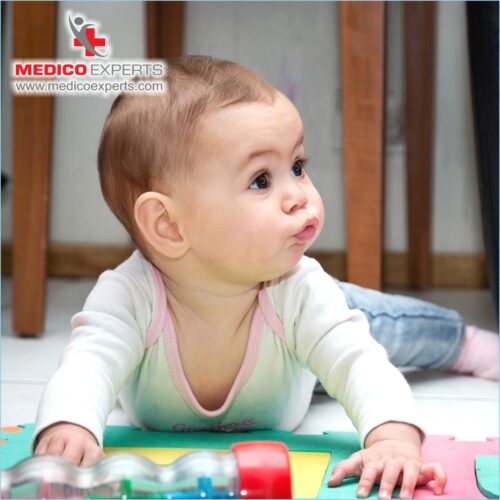
Brian took him to a doctor who diagnosed infantile autism in Romy. He asked a series of questions that confirmed Romy was suffering from autism.
Brian was really worried as he wanted his son to become a doctor. He wanted his son to communicate with him in nonverbal ways.
He was searching for some relief for his child when his friend John told him about MedicoExperts in India.
Brian came to India with Romy and with the help of MedicoExperts, he got in touch with the best doctors in the country.
Romy underwent stem cell therapy for his autism and within 3 months, he was able to hug his parents with joy and love.
The entire family was thankful to the MedicoExperts team and doctors for their help.
Let us now know in brief about infantile autism.
What is infantile autism?
Infantile autism refers to autism in young children whose age is approximately 2 years. Autism spectrum disorder on the other hand refers to the entire range of developmental disorders in children which includes several diseases altogether.
Let us know about the various symptoms of autism at various ages during their early years.
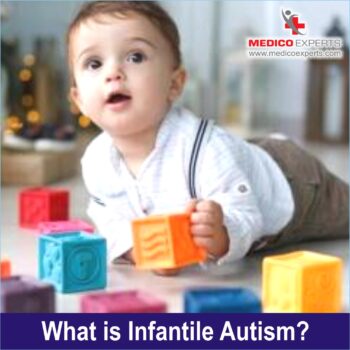
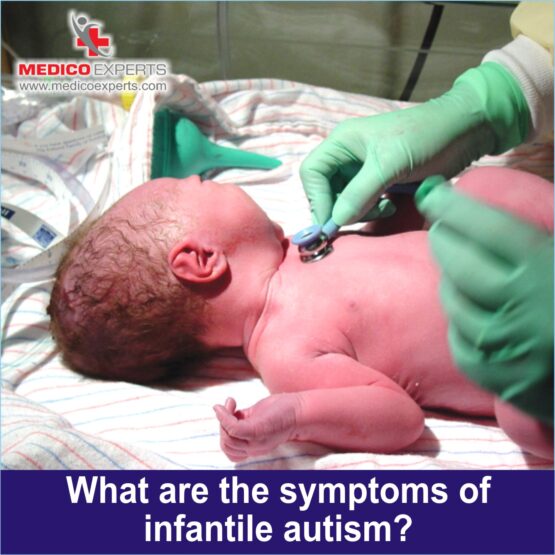
What are the symptoms of infantile autism?
At 3 months of Age
- Unable to make eye contact
- Not following moving things
- Not trying to pay any heed to new faces
At 7 months of age
- Not trying to laugh or smile
- Not trying to touch various objects
- Not making sounds or babbling
- Not showing love for the parent and caregiver
- Not responding to when they are held or becoming very rigid
At 12 months of age
- Not responding when their names are called
- Not pointing towards objects or persons
- Not clapping their hands
- Has not uttered any word
- Not enjoying the presence of other children
At 18 months
- Delayed speech or unable to speak properly
- Repeated behavior or again and again spinning the wheel of the toy
What are the causes of infantile autism?
a. Genetics:
Genetics play a great role in causing infantile autism. Mutations or defects in the genetic material ( chromosome) are responsible. Particularly, chromosomes 10, 2, and 7 are linked to autism.
Other genetic defects can also be responsible for improper brain development and malfunction of neuronal circuits in the brain. The brain defects as a result of gene mutations may be inherited or may occur spontaneously.
b. Environmental factors:
Viral infection in the mother’s womb can cause defects in the fetal brain and cause infantile autism. Pre-term birth, low birth weight, and zinc, and vitamin deficiency of the pregnant mother may also cause autism in the child.
Exposure to pesticides and environmental pollution faced by the pregnant mother may also cause autism in the child.
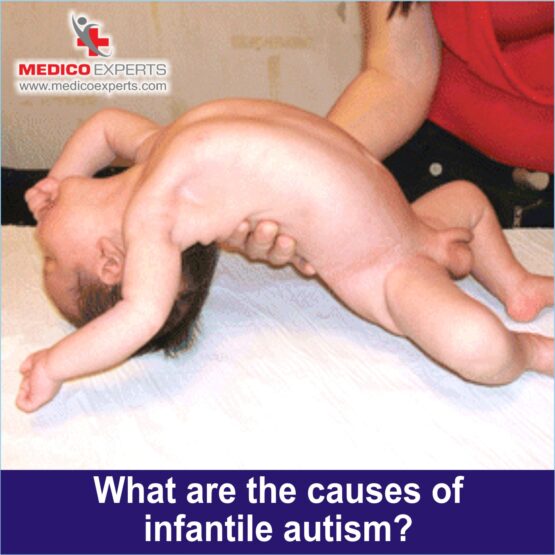
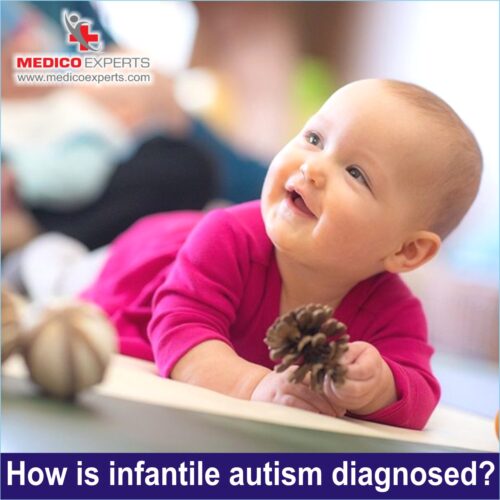
How is infantile autism diagnosed?
There is no blood test for infantile autistic disorder or it may not be detected by CT or MRI. The only way to understand whether your child is suffering from autism is to go for developmental monitoring.
Developmental Monitoring:
In developmental monitoring, the behavior, playing skills, speaking skills, and thinking capacity of your child are monitored from time to time. At specific years of age, the doctor will observe the development of the child through specific questionnaires.
It is difficult to detect autism only from the behavioral analysis and it requires skilled professionals. Sometimes, detection of autism takes lot of time and early intervention is missed.
Genetic Tests:
There are genetic tests to understand defects in chromosome 10 and X chromosome, and also tests to differentiate infantile autism from Retts syndrome- another developmental disorder.
What are the Risk factors for infantile autism?
- Autism tend to affect families where already some members were affected before. Identical twins have a greater chance of developing autism. Even, if the sibling has autism, then the child has some chance of developing autism.
- If the child is born before the completion of the entire pregnancy period, he has the chance of developing autism. Particularly babies born at 26 weeks of pregnancy are at a high chance of developing autism.
- Genes are known to play role in autism development. Autism is linked to syndromes like fragile X chromosome, Down Syndrome, Tourette’s syndrome, etc. Random changes in gene sequences called mutations are the main cause of developing autism.
- Exposure to certain chemicals and drugs by the pregnant mother can cause autism. Drugs taken for enhancing mood, anti-seizure drugs, and medicines to delay labor can make the unborn baby prone to autism. Exposure to plastic by the just born child can increase the chance of developing autism.
- If the father of the child is in his 50s, he has some chance of getting an autistic child as sperm may have mutations due to his age. The age of the mother is also responsible. But teenage moms are also found to give birth to autistic children.
What is the treatment for infantile autism?
This is a very effective therapy to treat autism. The therapist first observes the child and then tries to develop positive behavior in the child. The positive behavior is always rewarded whereas the negative behavior is ignored.
There are various types of behavioral therapy and the two most important types are discrete trial training and pivotal response training.
In discrete trial training the therapist instructs the child to do an action. Then the therapist prompts that action and if the child responds positively then the child is rewarded. In this, the therapist teaches the child various good behaviors and makes him do many positive exercises one after another. The learning process is always rewarded, so that the child practices it every day.
In pivotal response training, the child is given the reward he demands. But the child has to make an attempt to perform an action before he is rewarded.
The aim of the speech therapist is to help infantile autistic children who cannot speak or understand the emotions associated with the speech or who cannot understand the facial expression.
Therefore, a speech therapist not only helps in vocabulary and sentence practice but also uses various tools like pictures and emotion cards to make the autistic child understand the nonverbal communication methods. The aim is to make the child able to hold a conversation with their communication partners.
The occupational therapists help the autistic child perform daily activities like playing, reading, taking baths, and eating. The therapists also use sensory integration therapy like jumping, exercising, drawing with foam and sand, and painting to control various stimuli associated with hyperactivities. Autistic children are hyperactive or hypoactive to light, sound, smell, touch, balance, and body movement sensation.
Advanced stem cell therapy for infantile autism treatment in India
Stem cell therapy is an innovative therapy and can be ideal in reducing the symptoms of autistic children. In stem cell therapy, stem cells are sorted from the bone marrow cells and cultured along with growth factors. They are then injected into the cerebrospinal fluid for an optimal response.
Stem cell therapy can be effective in reducing the hyperactivity and various sensory hypo and hypersensitivities present in the autistic child. Along with applied behavioral therapy, it can help in adopting ideal behaviors like proper eating, bathing, and playing. The child may develop the ability to understand the emotions of the parents and the caregivers.
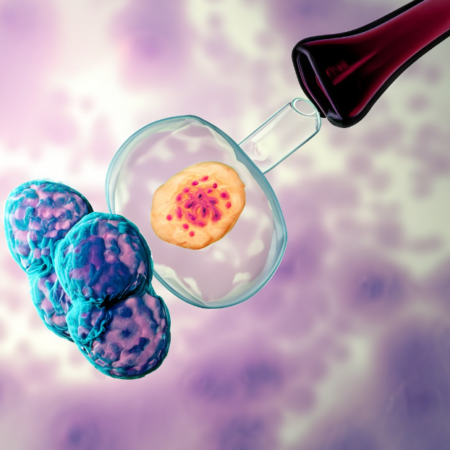
Cost of treating infantile autism
The stem cell therapy for infantile autism cost in India starts from 2000 USD per cycle, depending on the patient’s current condition, treating doctor, and suggested protocol.
Conclusion
Infantile autism is a type of autism spectrum disorder that is present in babies aged less than 2 years old. It has many symptoms including the inability to make verbal and nonverbal communication with other people. Typical symptoms of autism like lack of emotion and eye contact are also present.
Occupational therapy, speech therapy, and behavioral therapy can help to reduce the symptoms but it can take a lot of time for the child to start living a normal life. On the other hand, stem cell therapy can be a promising treatment to get relief from the symptoms of autism.
MedicoExperts is a 24/7 global virtual hospital involved in facilitating treatment for autism. It has a well-renowned panel of neurologists and stems cell therapists who can take care of autistic children to relieve them of their symptoms using advanced stem cell therapy.
Frequently Asked Questions and patient concerns:
Q1. Is infantile autism genetic?
Ans. Infantile autism can be genetic in nature. It can happen as a result of a defect in the X chromosome, chromosome 2, or 7.
Q2. What age is infantile autism?
Ans. Generally, the age of infantile autism is 2 years.
Q3. What is the current status of stem cell therapy from the regulatory framework?
Ans: The stem cell-based therapy for autism is in the research phase and not yet formally approved by ICMR. However, the application of stem cells, popularly known as bone marrow transplants, in blood-related disorders is approved by ICMR.

MedicoExperts is a Global virtual hospital which is established to offer quality healthcare services at affordable pricing without compromising the success rates of the treatment.
MedicoExperts is having a network of highly experienced super specialist doctors and well equipped hospitals across the globe and offering second opinion through online video consultation and surgical interventions through its empanelled super specialist doctors at its network hospitals in 17 countries from 3 continents.
By the virtue of its approach and model, MedicoExperts is successfully achieve to deliver
- Latest and most advanced treatments with success rates of international benchmarks.
- Multiple cost options depending upon the hospital facilities, with the same doctor.
- Treatment option in multiple cities/state/countries.
- Trust and peace of mind.
Most suitable for patients who are looking for:-
- Planned Surgeries and treatment from most experienced doctors and at multiple cost options as per hospital facilities with best possible outcomes.
- Second Opinion from expert doctors.
- Complex cases involving multi specialities
- International patients looking for treatment from Indian doctors

Author Bio:
Dr. Ashita Nandgaonkar – BHMS, MS in psychological counseling
Dr. Ashita Nandgaonkar is a highly esteemed homeopathic doctor with a passion for holistic healing and patient-centered care. Dr. Nandgaonkar remains dedicated to raising awareness about the benefits of homeopathy and promoting its integration into mainstream healthcare. Her mission is to empower individuals on their journey to health and wellness, embracing the holistic approach that homeopathy offers. She has a special interest in researching Homeopathic solutions for diseases that are difficult to treat with conventional medicines and therapies.
Content Medically Reviewed By MedicoExperts Editorial & Clinically Review Board



